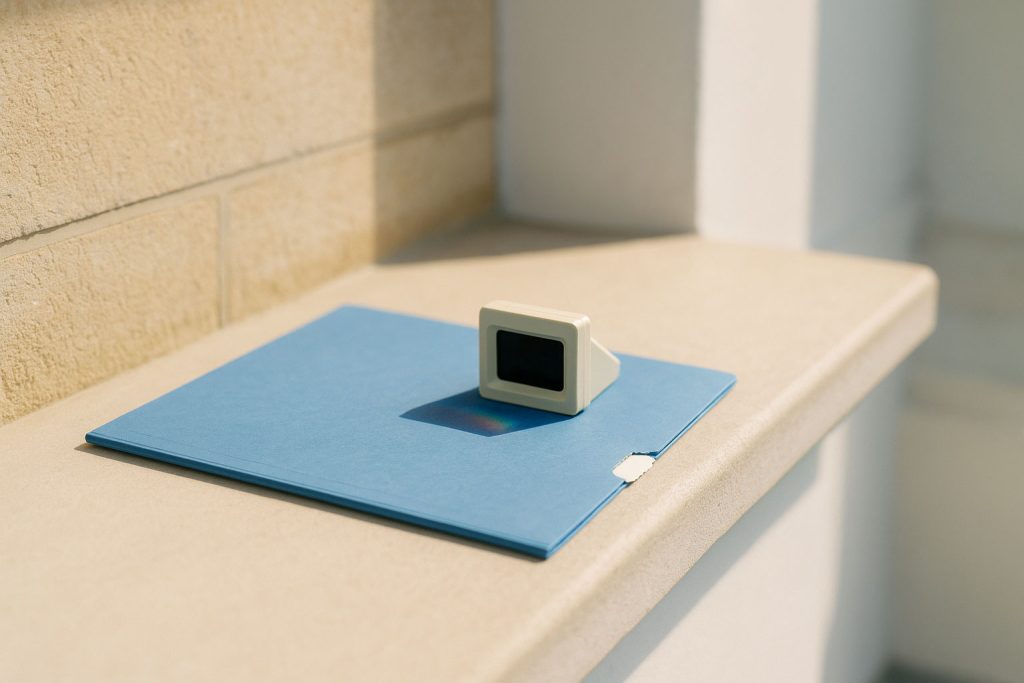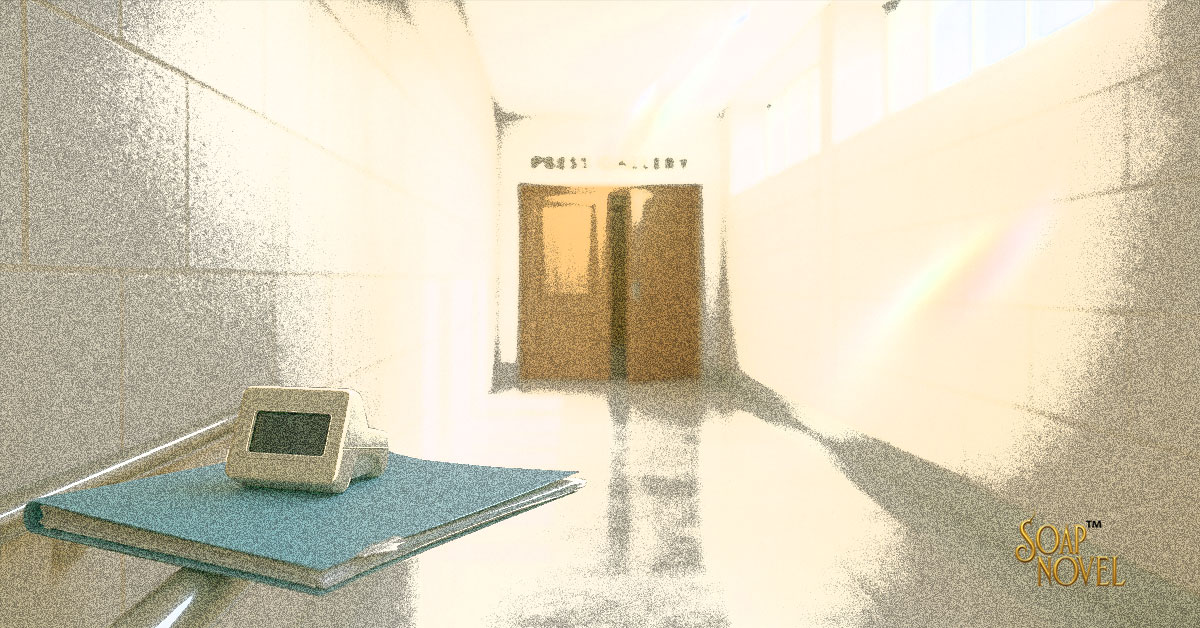Corridor / Night — Cape Town, Parliament wing
First-time here? Start at Chaptisode 1
Published: September 16, 2025 SAST. UTC +2
The light acknowledged.
For the last time that day, the corridor in the Parliament wing, Cape Town held prismatic for two clean seconds—no flourish, only a measured pane of color pressed across plaster—then faded to worklight. The cabinets deferred their next argument to morning; the hinges seemed to agree. Air settled. A map pin somewhere gave up and lay down.
No alarms. The building listened to itself: ducts cooling, wiring letting go of its small electric worry. The single chord hung where the rafters remembered weight—shorter than yesterday, truer maybe—signed its name into silence.
Down the stairs, a badge reader blinked out of tempo and corrected itself with a sigh. Screensavers woke, realized no one was there, and returned to floating logos. The clocks refused to speak to one another for ninety seconds; then, embarrassed, they shook hands. The building declined to call it a coherence echo.
Outside on Parliament Avenue, a Hilux pivoted toward a safer street. Paper in the glovebox murmured when the curb caught the tire.
On the wall near the press gallery doors, a taped tab dangled from a blue docket sleeve where another had been torn clean away. Note inked on the spine: §2 reserved.
Some buildings keep time; this one keeps secrets until morning.
Clerk’s Window / Morning — Cape Town, Parliament Registry
At the Parliament Registry, the clerk slid the glass panel open with two fingers and a caution learned from machines. A narrow cart carried exactly five items: stamp, ledger, docket, pencil, tape.
“First reading,” she said to no one, and laid the docket down. Blue stock. Crisp. Title block lettered by a hand she did not know:
WINDOW ACT — FIRST READING
She penciled a margin line where the title wanted a witness:
- §0: Daylight is evidence.
- §1: Exposure precedes detonation.
- §2: (reserved)
She stamped the time. The stamp fought her, then agreed: 08:01. Across the hall, the wall clock insisted it was 08:02 until the second hand remembered what a circle was and came home.
She taped the docket’s torn edge with one strip—ceremonial, not structural—and wrote “frame before flame.” The phrase had arrived on a note under her keyboard at opening. No one had passed the counter. The note had not been written so much as allowed to happen.
A junior minister from Pretoria’s side of the ledger hovered, pretending not to. “Does §1 deputize the gallery?” he asked the glass.
“It deputizes whoever knows how to look,” she said, and slid the docket into the sleeve.
Somewhere behind her, a printer warmed without being asked.

UN Office / Early — Nairobi, UN Complex
She had learned to sleep with the printer tray closed. This morning she woke before the birds and taped it shut anyway—two neat bands across the plastic mouth, an extra folded under to catch doubt.
By 07:03 the office smelled like long-night paper. She unlocked the door to the UN complex in Nairobi and stood still. Chair pushed in. Desk clear. Tray taped.
A single page waited on her chair.
Monospaced. No letterhead. No signature.
assurance ≠ audit
She did not touch it. She read it once, twice, set her bag carefully on the floor as if the carpet had changed jobs. The printer hummed—a small, guilty warm-up—then quieted. The job queue was empty. The green light, bored, blinked at a pace that felt like someone else’s idea of time.
On the sill, a draft pushed the blind to a rhythm of two. The wall clock considered the motion and skipped, then pretended it hadn’t. She copied the line onto a sticky note and underlined the symbol once.
In the hall, a custodian rolled past with a toolbox. He paused, looked in, and said what the building was already thinking: “Daylight is evidence.”
She filed the page in the top drawer marked windows—do not open.
Hilux / Dawn — Cape Town streets
The Hilux idled along Parliament Avenue, then slipped into a side street that knew how to keep a secret. The driver eased the glovebox open and took out a plastic slide viewer—thumb-smoothed, school-lab cheap, labeled in pen: frame before flame.
He raised it to the windshield. The city arranged itself inside the small rectangle like a witness standing up. Windows trimmed themselves to size; doorways shrugged and waited. The device was only plastic and air, but the street accepted the instruction.
He clicked a blank slide through out of habit. Chk. An answer arriving.
Through the viewer, the press gallery doors looked closer than they were. He tested the angle, then set the viewer on the seat and wrote two lines on the back of a parking receipt:
- §0 — Daylight is evidence.
- §1 — Exposure precedes detonation.
He tore the receipt top, folded the piece into the blue sleeve he should not have, and listened. A relay under the dash coughed and chose quiet. Downtown clocks carried on pretending they’d never disagreed.
Through cheap plastic, the city behaved like evidence.
Edit Room / Midday — Brussels, G7 Secretariat
Seven screens. One word in dispute.
On the shared draft, AUDIT wore a strike and a quiet replacement: assurance. A footnote trailed it like a nervous chaperone: procedures to establish pre-event sufficiency of control without declaring facts already fixed.
Someone typed deterrent into the note, then took it back out. The cursor hovered, ashamed of its appetite.
Version history tallied the day’s small betrayals:
- 09:12 — “assurance” accepted.
- 09:47 — “deterrent” proposed.
- 09:49 — “deterrent” withdrawn.
- 10:03 — footnote broadened to include gallery handling.
A policy aide ran a search for WINDOW ACT across cables and frowned at the returns: three mentions, none official, one misspelled. He highlighted gallery handling and rewrote it as custody at first light, then watched the phrase sit like a glass of water no one wanted to claim.
“If we replace seeing with assurance,” a drafter said, “someone will accuse us of staging the world.”
“No,” another answered, not looking up. “They’ll accuse us of timing it.”
Consensus arrived the way fog does—everywhere, then gone.
Cabinet Antechamber / Afternoon — Pretoria, Union Buildings
The antechamber kept its own weather. Files exhaled. Carpets remembered conversations.
A junior minister hovered at the map table where ground routes had been threaded with pencil and patience. Two pins hovered off the coast north-east, not quite naming Eritrea or Djibouti. The label card read: Border Council — ground first, air later.
Counsel flipped a thin folder closed. “If §1 lives,” she said, “the press gallery in Cape Town becomes part of chain of custody. Daylight will make witnesses of the press whether they RSVP or not.”
“Reporters as first responders,” he murmured, finding it too sharp. He wrote §2 reserved on a sticky and tucked it under his watch lid.
Pretoria argued; Cape Town inhaled; Bloemfontein remembered where the shelves are.
On the credenza, a small rhythm: two taps from somewhere beneath the wood, like a building counting to two and being satisfied. “Ground first,” he said, closing the map. “Then sky.”
The hinges waited, not entirely patient, and the room agreed to postpone its argument until morning.
Registrar’s Minute — Bloemfontein, Supreme Court of Appeal
The registrar initialed a slim circular and set it under the green lamp. Window Act (proposed) was penciled in the subject line with a cautionary arrow toward §1. No opinion, only logistics: filing nomenclature; daylight provisions; gallery seats as evidence handling. The seal cooled. In the quiet, a clerk’s shoe tapped twice, then stopped—as if someone had counted to two and was satisfied.
War-Map Table / Late Afternoon — Pretoria, Union Buildings
The logistics lead nudged a grease pencil along gravel tracks that were not yet roads. Border first, then sky was lettered at the top of the acetate like weather. Two discreet pins hovered near the Horn, careful not to name what everyone could read. A third pin sat inland with a question mark that sounded like a throat-clear.
“Ground lines, custodial,” he said, mostly to the map. “Air only after chain is visible.”
A deputy laid a transparent overlay: custody at first light. The phrase looked temporary and permanent at once.
He pressed the corners flat. Somewhere in the building a hinge rehearsed patience. The corridor counted to two and stopped, pleased with itself.
Maps don’t lie. They rehearse.
Safehouse / Dusk — N’Djamena
The handler kept the room without letting it keep him. Fan ticking. Curtains that didn’t quite meet. A phone face-down on a folded towel.
On the table: a card with a bounty scrawled in block letters, unclaimed; another with CONTAINMENT > DESTRUCTION written twice, as if repetition could pin it.
He opened a cheap notebook and logged the ping times anyway. The last one aligned suspiciously with nothing—then looked less suspicious when the clock remembered the circle and corrected itself.
He capped the pen and slid both cards under a plate. Dust settled on the towel as if practicing discretion. “We keep it inside the window,” he said to no one, then checked the door chain like a man who trusted metal more than plans.
Containment is a promise you make to a fuse.
Security Hub / Evening — Cape Town, Parliament Ops
Monitors made a soft lake of light. Camera feeds stepped out of rhythm, then returned with the embarrassed efficiency of professionals late to a meeting.
“Log it,” the operator said. The junior typed:
Event: coherence echo
Drift: 90s
Visual: prismatic → worklight (2s hold)
Action: none
A door counter miscounted, decided it had not miscounted, then filed a note to forgive itself. In the corner, the badge reader that blinked earlier tried for stoic and achieved decorative.
On the main display, the press gallery looked like a single lung deciding whether to inhale. The operator zoomed, then unzoomed. “No fireworks,” she said.
“Not our department,” the supervisor replied. He rubbed his thumb against his ring, reading the room like Braille. “But the room’s reading us.”
The system didn’t blink—it practiced.
Press Gallery / Nightfall — Cape Town, Parliament Floor
The doors stuck, argued, yielded. Seats filled themselves with people who had promised not to be scenes. Laptops fanned open like a tideline; pens performed neutrality.
On the chamber display, a line arrived without a sound cue:
WINDOW ACT — FIRST READING
§0: Daylight is evidence.
A few laptops closed, the way eyes do before a bright thing.
The clerk from the Registry sat three rows back, a strip of tape stuck to one finger like a quiet oath. A stringer wrote assurance ≠ audit on the corner of a press pass and circled the symbol once. A camera refused to focus, then remembered it knew how.
From somewhere above the cornice, the building hummed the single chord—shorter than yesterday, harder—like wood deciding what to hold.
No speeches stayed long. The docket did.
Backchannel Café / After — Cape Town
Steam sketched diagrams in the air above cups that had become pretexts. Counsel slid a napkin across the table: Curtain Procedure at the top, a neat ladder underneath.
“Staged obscurity,” she said. “Not hiding. Sequencing.”
“Sequencing is timing with a tie on,” the reporter answered, drawing a rectangle and shading it until it looked like a window turned away.
Counsel tapped three boxes: mask, meter, release. “For people who fear that §1 deputizes the room.”
“For people who fear light,” the reporter said, not unkindly. He added at the bottom: curtains don’t stop blasts—they time them.
They looked at the line until it belonged to both of them and neither. Outside, the café’s hinge performed a sigh. Inside Parliament, a corridor counted two and held the number like a coin.
They left the napkin. It looked official by accident. Most policies are accidents with minutes attached.
Corridor / Close — Cape Town, Parliament wing
The building kept its promise. The light acknowledged and held prismatic for two efficient seconds—no sermon—then folded back to worklight. Air filed itself. The cabinets deferred their argument with the grace of people who planned to win tomorrow.
On the wall, the blue docket sleeve showed its torn tab honestly. Inside, the title sat up straight.
WINDOW ACT — FIRST READING
§1: Exposure precedes detonation.
§2: (reserved)
A chord lifted, braced the rafters, and let go like a beam satisfied with its arithmetic. Somewhere in Bloemfontein, a lamp cooled on a registrar’s circular. In Pretoria, a sticky under a watch lid whispered what it thought time should do.
Outside on Parliament Avenue, the Hilux found the gear it wanted. Paper in the glovebox kept its counsel.
Somewhere a hinge decided which day tomorrow would be.
Daylight is evidence.
English
You’re reading Anomaly State — a serialized political fiction saga.
Although satirical and fictional, TrumpaPhosa carries a thread of purposeful prophecy and hidden revelation. Some readers may interpret it as a roadmap — a reflection of what is, what was, and what may yet come.
Zulu (isiZulu)
Ufunda Anomaly State — uchungechunge lwenganekwane yezepolitiki.
Nakuba kungukuhleka nokuyinganekwane, iTrumpaPhosa ithwala umqondo wokuphrofetha ngenhloso kanye nokudalulwa okufihlekile. Abanye abafundi bangakuhumusha njengemephu yomgwaqo — ukubonakaliswa kwalokho okukhona, okwedlule, nokungenzeka kusasa.
If this story resonates with you, consider supporting the protocol with a small Bitcoin donation. Every satoshi counts in keeping the signal strong—share and enjoy!
You’re reading Anomaly State — a serialized political fiction saga.
🔗 Bitcoin Address: 3NM7AAdxxaJ7jUhZ2nyfgcheWkrquvCzRm
Dive into TrumpaPhosa: Anomaly State on Readup.social, meet readers worldwide, and call the next twist.”


